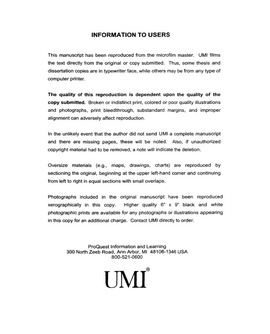| dc.contributor.advisor | Ragan, Tillman, | en_US |
| dc.contributor.author | Williams, Mary Etta. | en_US |
| dc.date.accessioned | 2013-08-16T12:18:16Z | |
| dc.date.available | 2013-08-16T12:18:16Z | |
| dc.date.issued | 2001 | en_US |
| dc.identifier.uri | https://hdl.handle.net/11244/322 | |
| dc.description.abstract | Sixty-one undergraduate students participated in the study. The Group Embedded Figures Tests was used to classify subjects as field dependent or field independent learners. The design of the study was a pretest/posttest control group design. Two independent variables were employed in this study: (a) conceptual model provision/nonconceptual model provision and (b) cognitive style characteristic (i.e., FD/FI). The dependent variables were: (a) posttest scores, (b) length of engagement with instructional materials. Data were analyzed using several statistical analyses: t-tests, univariate analysis of variance, and stepwise multiple regression analyses. | en_US |
| dc.description.abstract | The results of the study revealed no significant main effect of conceptual model provision and no interaction effect of conceptual model provision and cognitive style characteristic (FD/FI) using scores from Posttest 1 and Posttest 2. FD/FI was found to be statistically significant on Posttest 1. FI subjects performed significantly better than FD subjects. The results also revealed no significant main or interaction effect for conceptual model provision and cognitive style characteristic on length of engagement with photography simulation Exploratory data analysis showed that Pretest performance were significantly correlated with Posttest 2 performance and that gain scores were significantly correlated with performance on both the Pretest and GEFT. From the results, the researcher concluded that conceptual model provision did not prove to be statistically significant; however, the cognitive style characteristic of FD/FI was statistically significant in terms of performance on Posttest 1. FI subjects performed better in the exploratory learning environment than did FD subjects on Posttest 1 and Posttest 2. FI subjects also spent more time engaging with the highly exploratory photography simulation. Due to the lack of significant findings for conceptual model provision and length of engagement with the photography simulation, more empirical research is suggested. | en_US |
| dc.description.abstract | The primary purpose of this study was to investigate the effects of conceptual model provision and a cognitive style characteristic (i.e., field-dependence/field independence) on problem-solving performance in an exploratory learning environment. A second issue investigated was the role of individual differences, more specifically cognitive style, in mental model development and problem solving in an exploratory learning environment. In addition, this study investigated what effects prior knowledge, prior experience with photography, computer playfulness, and interest in photography have on problem solving of FD/FI learners. | en_US |
| dc.format.extent | ix, 173 leaves ; | en_US |
| dc.subject | Education, Educational Psychology. | en_US |
| dc.subject | Education, Technology of. | en_US |
| dc.subject | Learning, Psychology of. | en_US |
| dc.subject | Individual differences. | en_US |
| dc.subject | Cognitive styles. | en_US |
| dc.subject | Problem solving Psychological aspects. | en_US |
| dc.title | The effects of conceptual model provision and cognitive style on problem-solving performance of learners engaged in an exploratory learning environment. | en_US |
| dc.type | Thesis | en_US |
| dc.thesis.degree | Ph.D. | en_US |
| dc.thesis.degreeDiscipline | Department of Educational Psychology | en_US |
| dc.note | Source: Dissertation Abstracts International, Volume: 62-03, Section: A, page: 0983. | en_US |
| dc.note | Adviser: Tillman Ragan. | en_US |
| ou.identifier | (UMI)AAI3009545 | en_US |
| ou.group | Jeannine Rainbolt College of Education::Department of Educational Psychology | |
